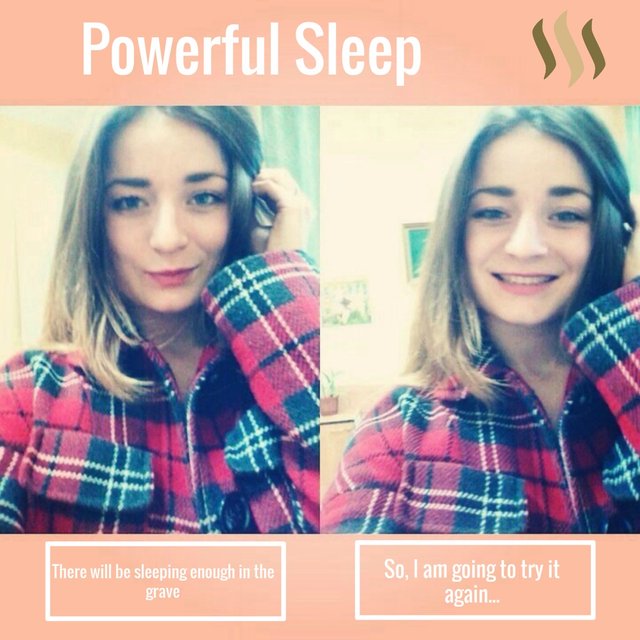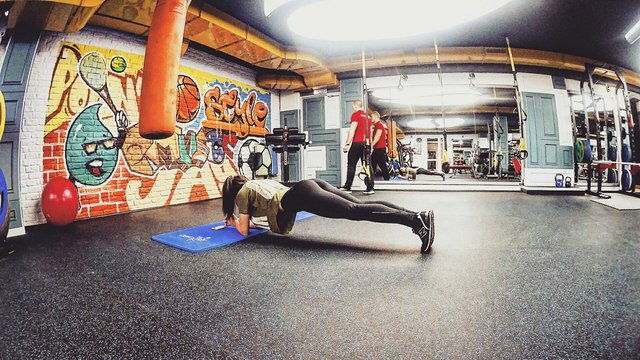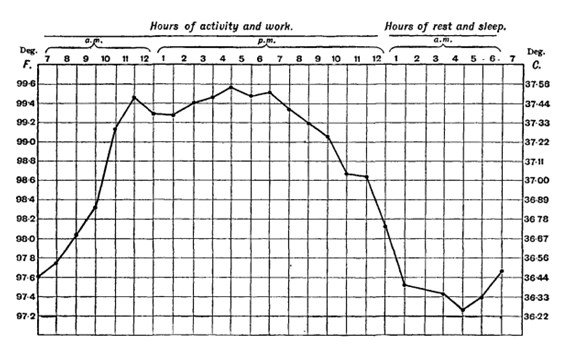Powerful Sleep
"There will be sleeping enough in the grave." - Benjamin Franklin
Yeah... Ben Franklin was awesome!

A few years back I read an interesting book by Kacper M. Postawski entitled, "Powerful Sleep". The concept was really interesting, as it claimed to provide factual evidence that the common understanding that the body needs 8 hours of sleep to thrive at its optimal performance level was a myth... It cites that 5-6 hours is more in line with the design of the body's natural clock... so long as the recipient of sleep is giving great care to the maintenance of the body and the balance of its needs...
This is certainly a controversial topic in the medical community as all experts seem to have their own data validating their viewpoints on the matter; but I am one who would rather put the data to a personal test, and see how my body responds.
I attempted to follow the plan of balancing the needs of the body as defined by Kacper M. Postawski, and was able to knock my sleep schedule down to about 5 hours per night with a small 15 minute power nap after lunch. This certainly increased my productivity throughout the day, and surprisingly, my energy levels were much greater than they were when I was getting 8 hours of sleep per night.
I was on this system for about 45 days, when I started to get lazy with it and reverted back to about 8 hours of sleep.
The difficult part for me was that the system he uses to engage the body, requires some serious dedication to lifestyle change, and I've gotta tell you, if you don't follow it exactly, and form the system into habits, you just won't have the energy to thrive, let alone survive, and like me, you'll be back to 8 hours of sleep in no time.
So, I am going to try it again... and this time I'm setting a better system into place to ensure I stay on track. I will analyze how my body responds for the next 90 days, then will make a more long-term decision...
I have to admit, the idea of spending less time sleeping is very appealing to me. I just imagine the amount of hours I could put into increasing my education, my skills, and my networth by adding an extra 3 hours a day to my productivity time...
I thought it was interesting to note some of the famous people I researched who sleep/slept less than 5 hours per day...
Jay Leno - 4 hours
Madonna- 4 hours
Florence Nightingale - 4 hours
Michelangelo- 4 hours
Napoleon Bonaparte - 4 hours
Bill Clinton - 5-6 hours
Nikola Tesla - 2 hours
Margaret Thatcher - 4 hours
Martha Stewart - 4 hours
Thomas Edison - 3-4 hours
Okay... that was fun. Now back to the concept of getting 5 hours of sleep as defined by Kacper M. Postawski....
A brief explanation for Postawski's methods for reducing sleep and enhancing energy levels:
As Postawski says, the human body is a finely tuned instrument, and when it's managed correctly, it will respond in every area, especially sleep...
First, Postawski gives a brief understanding of the body's sleep clock and how we typically go through the 5 stages of sleep each night...

Each stage of sleep is accompanied with different brain waves... The brain is most active in REM sleep (this is when we dream), and is least active in stages 3 and 4 (this is deep sleep).
During deep sleep the body does the most healing... Notice that the majority of deep sleep takes place in the first few cycles (hours 1-4). The remainder of the night is mostly spent in REM sleep...
It is at the top of the cycle (REM) when our bodies are most ready to awake. However, if we wait for the cycle to go back down toward the bottom (stages 3 and 4), we will be in deep sleep again and will have that "pry yourself out of bed feeling" if we awake...
The key is awaking at the appropriate completion of a cycle, after having received enough deep sleep to heal the body and awake with good energy levels. As you become familiar with the timing of your own cycles, you will better be able to manipulate the system...
His methods to maintain the body to get the most out of these cycles of sleep are as follows:
Eat Healthy Throughout the Day…
Traditionally, us Americans tend to eat large meals which have trained our bodies to be set on a course of energy spikes and depletions...
Eating smaller portions of healthy, energy producing foods throughout the day (say 3 smaller meals and 3 snacks) will give the body a more constant energy level, and eliminate the 'sleepiness' factor so many of us feel after we eat a meal. Usually when your body gets tired after eating, it is the direct result of waiting so long in between meals.
Keeping a well balanced program of healthy, consumed foods will increase your energy levels and require less from your body... including sleep, as your body clock is more balanced and less repair time is required during the sleep hours.

Exercise in the Morning…
When you awake in the morning it is because your body temperature is heating up. Your body temperature isn’t always 98.6 degrees. This is the averaged norm, but throughout the day your body temperature changes from slightly warmer to slightly cooler. This cycle is called the circadian rhythm.
Your sleep schedule and energy levels follow the circadian rhythm throughout the day with incredible accuracy. The key point in changing certain habits to increase energy levels and enhance the affects of sleep on the body, is in using the circadian rhythm as an ally to your lifestyle, rather than fighting against the inherent nature of the body. This will ultimately increase the power of your sleep, and give you greater vitality of energy levels throughout the day...

Here are a few basics to understand the nature of the circadian rhythm and how it affects the body:
At night, when your body is preparing for sleep, it naturally cools down. In sleep stages it is the coolest.
When you are preparing to awake in the morning, your body will slightly warm up as it is becoming more active. This heat gives you energy and you soon awake.
One of the basic ways to manipulate the circadian rhythm to fit with your desired sleep schedule is to exercise, at a set time, after you awake in the morning. Exercising shortly after waking is the best time as your body will heat up rapidly and give you a giant boost of energy to start your day.
As this practice is applied every day, the body will begin to naturally warm-up at the time you have trained it to, as it is preparing itself to become active. It likewise adjusts its circadian rhythm to meet with that schedule.
The following image is a schedule of the body’s typical temperature cycle or circadian rhythm and energy throughout the day. Keep in mind, these cycles can be altered according to the choices we make throughout the day:

If you are going to reduce your sleep schedule, it is recommended that you do so by eliminating 15 minutes each night... Your body will adjust more appropriately at this rate.
Hydration…
Water is one of the most important tools here. When you sleep, the water that is stored in your organs during the day, travels into your muscles to heal them. Much of the water in your system is used to digest as you sleep.
If you don’t have enough water in your body when you sleep, your blood will clump together and will not travel as effectively to all your muscles to repair them. The result is a body that does not feel well rested and needs more sleep time to heal itself. Many people awake thirsty in the morning because they didn’t drink enough water before entering sleep.
Each part of the body needs a certain amount of water to do its job every day. If there isn’t enough water to go around, each part sacrifices a bit of its performance value, to compensate for the lack of hydration, and to ensure that the other parts of the body receive their needed minimal share. This causes you to lose energy throughout your day, sleep longer during the night, and ultimately, can be the cause of many sicknesses and diseases.
Here is a breakdown of how much water your body uses each day:
· Your Intestines: about a 1/2 cup of water
· Breathing: about 1 1/3 cups of water
· Your Lungs: about 2 cups of water
· Your Skin: about 2 cups of water
· Your Kidneys: about 5 1/2 cups of water
On a typical day your body will use about 12 cups of water (or 8 - 8 ounce glasses).
A few simple rules to follow are:
· Have a glass of water before you go to bed.
· Have a glass of water when you wake up.
· Have six more glasses of water spread throughout the day.
Sun Light…
Sunlight is one of the most important energy giving sources for your body. In fact, the circadian rhythm chart shown previously, follows sunlight to a large degree. When your eyes take in sunlight your body warms up and your energy levels increase. For this reason, it is very important for your body to take in sunlight right when you awake. This natural light lifts your circadian rhythm and gives you a huge boost of energy.
If you are in an area where the sun doesn’t shine when you wake, you can buy an artificial light box and place it in front of you for about 15 minutes after you wake. This helps moderate your circadian rhythm, and puts your energy levels on a more congruent level with your new sleep schedule.

This light is much different than a typical light bulb, and is designed to mimic sunlight, giving off the same type of energy. There are many different types on the market (I use the Apollo Health – GoLite M2).
By strategically receiving enough sunshine at different times throughout the day, you'll control your circadian rhythm. If you want to enhance your energy levels at different times throughout the day, expose yourself to this light.
Power Nap…
The circadian rhythm usually drops right after lunch time. If desired, this is the perfect time to get a quick power nap to re-energize yourself for the rest of your day.
If you do take a nap, only sleep for about 10-45 minutes. This is completely sufficient. You want to make sure you are not in deep sleep when you awake, otherwise you will have that pry yourself out of bed feeling. If you do experience that after napping, just try a slightly shorter period the next time, as everyone’s body is different and enters deep sleep at different intervals.
Sleep Schedule…
In order to improve the quality of your sleep, your body will respond best when everything is done on a set schedule. When you get off schedule, your body often responds with a poor night’s sleep, and you feel as though you are dragging energy all day long.
Go to bed at the same time every night. Awake at the same time every morning. Soon, you won't even need an alarm clock as your body's sleep clock will naturally wake you.
Get light into your eyes at the same times throughout the day.
Exercise at the same time.
Eat at the same time.
Drink your water throughout the day.
Stay consistent and your body will reward you with an incredible night’s sleep every night.
Okay... so that's the plan for this week. I will strategically limit my sleep by 15 minutes each night until I reach my target goal of 5 hours of sleep. This should take me 12 days. The reward? To me it's huge... I will be adding about 1,095 hours a year of productivity, equating to just over 45 extra days! If I carry this on for the next 50 years, I will add over 6 years of productive hours... Good news...

I will return and report on helpful tips I find along the journey... Enjoy!
I appreciate you covering this topic and sharing your advise on how to get on top of sleep. Getting enough quality sleep is probably the most important factor to overall health. Next would be proper hydration, then diet and exercise.
I've suffered from ongoing bouts of insomnia for most of my life, due mostly to an over-active mind and being ruled by stress (things that I've only recently gotten a handle on), which has blessed me with firsthand experience of what it's like to operate at sub-optimal energy levels and mental clarity.
After going many weeks on consistently averaging four to five hours of sleep per night and having relatively (physically) active days, finally getting a good night's sleep can leave you feeling like a reborn man -- actually, more like a "god" in comparison to the usual.
I completely agree with you! I had sleep disorders too. And it's very bad! I will try to carry out this experiment with care. Thank you very much for your detailed comment. I wish you strong health and good sleep :)
Thanks, and same to you :)
Nice article, I am looking forward to see the result of your experiment, keep us updated. Good luck!
Thank you so much! I will share the experience)
Thank your for your post. Very interesting. I must try it :)
Just be careful) And good luck to you)
Very interesting, as someone who's main problem is getting enough healthy sleep there are some valueable reminders in this artivle. Thanks.